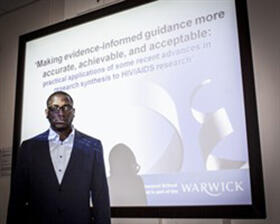
LSTM’s seminar series continued today with a presentation by Dr Olalekan Uthman, Assistant Professor in Applied Research at Warwick University. Ola is a strategic appointment between the University of Warwick and LSTM, and his presentation was titled, “Making evidence-informed guidance more accurate, achievable, and acceptable: practical applications of some recent advances in research synthesis to HIV/AIDS research’”.
Dr Uthman started by looking at the cross cutting theme of evidence based medicine, and how evidence synthesis helps to
fulfil the objectives of the Centre for Applied Health Research and Delivery (CAHRD), and the Research Synthesis themes in LSTM, which is achieving transformation in health systems to improve the health of poor and vulnerable populations.
He went on to look at the importance of research synthesis, in providing a review in which bias has been reduced by the systematic identification and review of all available data, from all relevant studies carried out on a specific topic. Systematic reviews are a requirement for the successful application of large grants, many major organisations have based their guidelines on them, and details of such a review maybe required for studies to be published.
He went through five case studies to look at the different significant advances made in systematic reviews:
- Network Meta-analysis – determining the best treatment for reducing the risk of tuberculosis in HIV infected persons
- Individual Patient Data Meta-analysis - is there an association between cigarette smoking and HIV status (in sub-Saharan Africa)?
- Bayesian Generalised Evidence Synthesis - what is the effectiveness of directly administered antiretroviral therapy on viral suppression among “high risk” HIV-infected persons?
- Trial Sequential Analysis – how strong is the evidence for pre-exposure prophylaxis for preventing HIV in high-risk individuals?
- Prediction Interval – how generalizable is the evidence on pre-exposure prophylaxis for preventing HIV in high-risk individuals?
Dr Uthman then answered a range of questions from students and staff in the auditorium. Many of the questions focussed on how reviews are updated following new studies, or if contextual matters can also be taken into account when looking at reviews.
Dr Uthman’s research interests focus on evidence-based medicine and social determinants of population health. He has worked across a wide range of health technology assessments with a focus on HIV/AIDS and other infectious diseases. He is an experienced Cochrane author and Cochrane Infectious Disease Group Editor, and has published several papers on multilevel and geographical analyses to examine the role of geographic, community and societal contexts in explaining variations in health.